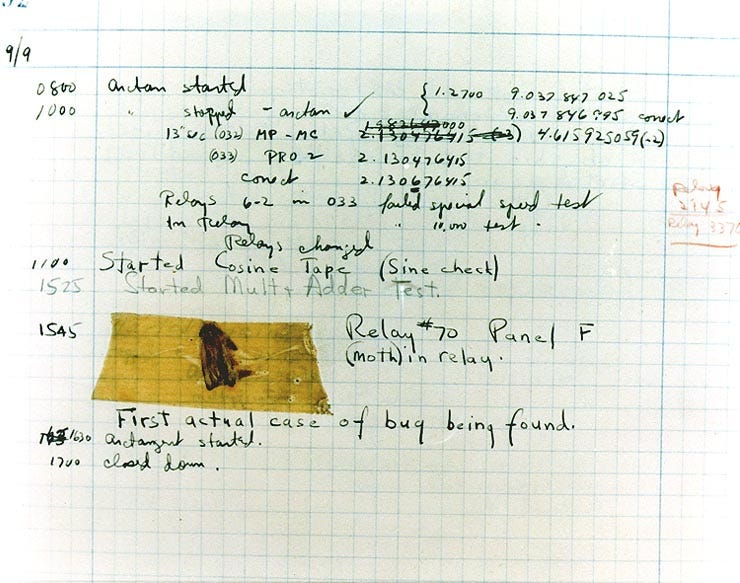The story of how computer bugs got their name is well known and documented. An actual bug was trapped in a computer, causing errors. The bug — a moth — was removed from the computer and taped into Grace Hopper’s computer log.
At least, that’s the story as it’s popularly told. It always sounded a little too cute to me because “bug” is such a perfect word for what’s being described. I mean, right there in the log under the moth someone wrote “first actual case of bug being found,” so the word must have been used metaphorically already, right?
It turns out the word “bug” was already used in a similar manner in engineering. So the story is not exactly apocryphal, but not quite as clear as it seems.
This week’s newsletter is about how one particular computer bug got its name.
I used to have some friends who worked at CNN. (I’m still friends with them; they just don’t work at CNN anymore.) I don’t know what it was like for them going to work there every day, but I thought it was neat as an outsider on those rare occasions when I had a reason to visit their workplace.
Once, while I was visiting my friend at CNN’s New York studio, he got called away for a minute. He left me sitting at the desk at the CNN Election Center set for a while with nobody around. It was a little bit surreal.
I got bored and took a picture.
In the mid-2000s, CNN had a citizen-journalism initiative called iReport. With digital point-and-shoot cameras finally affordable and common, anyone might witness and capture a newsworthy event at any time. The iReport initiative was a way for people to submit their news photos and videos to CNN in exchange for, well, not very much. They didn’t pay anything, and you had to give up a lot of usage rights that they customarily would have paid for if you were a “real” journalist. I guess you got bragging rights, but that’s not a form of currency in any country that I know of.
Until 2008, iReporters (a chill just ran down my spine typing that word) submitted content through CNN.com. But in 2008 they launched iReport.com, a dedicated site just for gathering citizen journalism submissions.
That’s when I heard from my other friend at CNN’s Atlanta office. She needed people to test the new iReport platform and asked if I would make an account and upload some content to make sure it worked. I’ll beta test anything, so of course I said yes.
But I’m a professional photographer and filmmaker. I don’t usually just give big companies the rights to my photos and footage for free. And the new iReport website had the same rights-grabbing terms and conditions as always. So I figured I’d just pick a video clip that I didn’t care at all about, something so meaningless and unimportant that I wouldn’t mind handing over broad usage rights to CNN. After all, the actual content here wasn’t important. I was just helping to test the system.
So I picked a low-quality clip from an old point-and-shoot camera. It was footage I shot on a beach in Florida some years ago. I uploaded it to the new platform where I had to give it a title for the submission. I called it “Birds on a Beach.”
It crashed the website.
Okay, that’s probably an exaggeration. I think I just got an error of some kind. Either way, it didn’t work. I reported the bug to my friend and moved on.
The next day, she sent me an amusing email:
You have become famous among our dev team. Well, not *you* really, but the uploading problem you identified yesterday has been deemed the "birds on a beach problem." It's being looked at carefully and it looks like we should have a fix some time soon. It's funny...right now there are several guys sitting around our war room being like "let's talk about birds on a beach."
I found that delightful.
A Thing You Should Listen To
Was that story any good? Was it interesting? I mean, not much happened in it. It was a personal story that amused me, but did it amuse you?
When launching this newsletter, I knew it would be a combination of popular culture, nerdy topics, some short fiction, photo essays, and personal anecdotes. But on that last point, how do you tell a personal anecdote and make it interesting to other people?
For inspiration, I turned in part to Stephen Tobolowsky. Even if you don’t know his name, you know him. He may best be recognized as the actor who portrayed Ned Ryerson in Groundhog Day. But he’s also a writer and a phenomenal storyteller of personal anecdotes. And he has a Podcast called The Tobolowsky Files.
Stephen has worked with so many people that of course he has terrific show business stories. But he also has heartfelt personal stories of love, loss, laughter, and living life outside his work.
The podcast began in 2009 and has intermittently come and gone. It just returned for a new season with a new YouTube channel featuring Stephen telling stories in front of an audience.
His stories are better than mine. And he’s a better storyteller than I am. But it’s nice to have a north star.
A Thing You Should Tell Your Friends
If you enjoy this newsletter, I’d love if you told people about it. With zero budget, it’s hard for me to get the word out that I’m putting words out. But if you tell two friends, and they tell two friends, we can start a MLM business with long downlines and big profits. No, that’s not right. Sorry, I meant that we can get enough people reading to keep me motivated to keep writing. I have a lot more topics in the queue that I’m excited to share with a wider audience.
That’s it for now. See you next week!
David
Post Script
Being issue 007, I considered making this issue somehow about James Bond. But I have nothing interesting to say about James Bond. The most interesting thing I know is that James Bond creator Ian Fleming also wrote the book Chitty Chitty Bang Bang about a magical flying car, but everybody knows that, right? And anyway, all my double-oh issues of this newsletter have a license to kill so I don’t want to single this one out.
If there are more than nine double-oh agents, is the next one 010, or 0010? Hmm.











